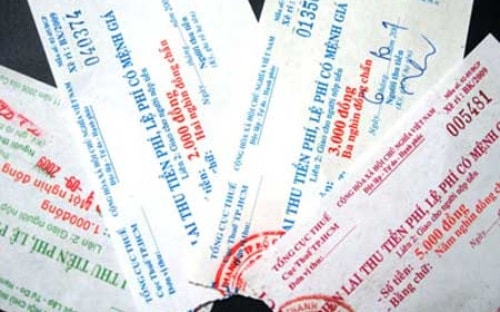Fees and charges will be more transparent
Along with the laws passed by the National Assembly at the 10th session, the Law on Fees and Charges has just been announced by the Office of the President. Accordingly, from January 1, 2017,The Law on Fees and Charges is said to have established a complete, synchronous, unified legal framework, in accordance with relevant legal regulations, gradually focusing on timely and fully reflecting revenue from fees and charges.
 |
The Law also overcomes limitations in the management of revenue from fees and charges; gradually calculates correctly and fully all costs to meet the requirements for the process of innovating the management mechanism of public service units, promoting the socialization of some types of public services, in accordance with the operation of a socialist-oriented market economy; ensuring transparent and public fee and charge policies, creating convenience for people and businesses.
Specifically, the current law stipulates fees and charges associated with public services provided by the State and enterprises. The collection, management and use of fees and charges are regulated by the State, which does not encourage enterprises to participate in providing public services.
In order to promote socialization and attract resources to participate in providing public services, the Law on Fees and Charges stipulates a list of fees and charges associated with public services provided by State agencies, public service units and organizations assigned by competent State agencies. In case the service is provided by an enterprise, the service price shall be implemented according to the provisions of the Law on Prices.
Notably, the detailed list of fees and charges issued with the law specifically stipulates the authority of the four agencies of the National Assembly Standing Committee, the Government, the Ministry of Finance and the provincial People's Councils for each fee and charge.
The principle of determining the fee level is one of the issues that was debated from many sides before the National Assembly voted to approve it.
Currently, the fees in the list attached to the law are provided by state agencies and public service units. However, in the future, some fees have the potential to be highly socialized and can be transferred to businesses for provision.
Therefore, the Law on Fees and Charges stipulates that the fee collection principle is that the fee level is determined to basically ensure cost recovery, taking into account the State's socio-economic development policy in each period, ensuring fairness, transparency and equality in the rights and obligations of citizens.
The law also clearly stipulates that the subjects eligible for exemptions and reductions are children, poor households, the elderly, the disabled, etc. and some special subjects as prescribed by law.
Regarding the management and use of fees and charges, the law stipulates that fees collected from service activities performed by State agencies must be paid to the State budget, except in cases where operating costs are allocated from fee revenue sources, which are deducted. Fees collected from service activities performed by public service agencies are partially or fully retained to cover costs and fees collected on the basis of approved estimates, and the remainder is paid to the Budget.
Fees collected from service activities assigned by organizations to perform by State agencies are retained in part or in whole to cover operating costs, management and use of fees according to the provisions of law.
To encourage socialization, 17 products and services have changed from fees to service prices set by the State.
These include irrigation fees, road usage fees, port and terminal usage fees, vehicle inspection fees, securities operation fees, etc.
Moving some public services to a pricing mechanism that allows the private sector to participate is believed to better serve the people.
However, the law only transfers the price mechanism to some fees that the State does not need to hold and there is competition to contribute to reducing prices and improving service quality for people.
As for services related to State management tasks, they are still regulated in the list of fees and charges provided by the State, serving the people. Some fees are transferred to a price mechanism, but to ensure that they are suitable for people's income, the State will set prices or use social security and insurance policies to support them.
According to VN Economy
| RELATED NEWS |
|---|
